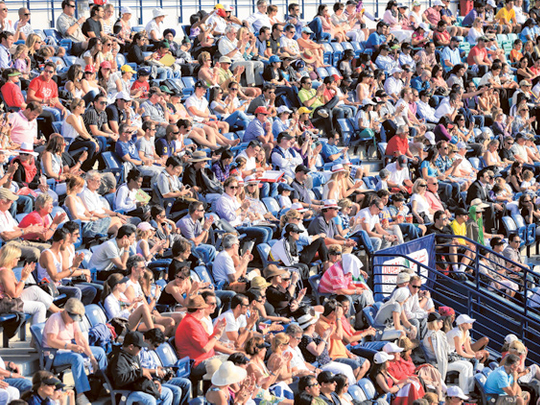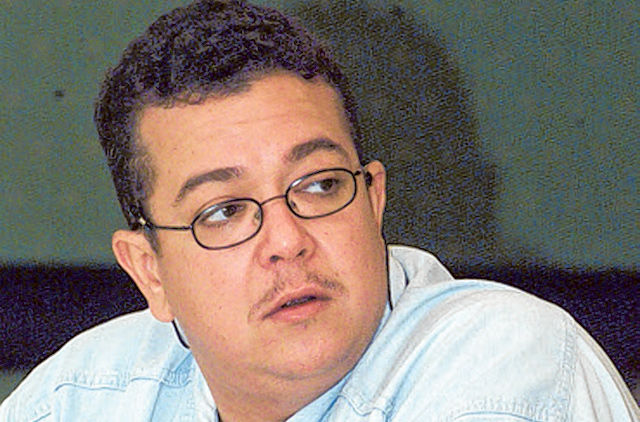
Without the rules of tennis, there wouldn’t be much of a game on the court. It’s a two-way street, however: the players have to play by the rules, and so do the spectators. Hany Al Khafief, the International Tennis Federation (ITF) supervisor at the Dubai Duty Free Tennis Championships, starting on Monday, guides us through what not to do while watching a match. It’s all about respect and courtesy — so pop on your tennis whites, leave your road rage at home, turn off your mobile and get ready to cheer — when appropriate.
Q: Are there any rules about making noise?
A: Spectators should not cheer during a rally, and in very particular between the first and the second serve. As an etiquette, do not clap or cheer on a player if they make a mistake or double fault, but only when a player wins a point.
Q: What should we keep in mind when watching a game?
A: Be respectful to both players and fellow spectators. Mobile phones should be switched off or put on silent and calls should not be made during the points. Spectators should understand that this is a player’s job and his office, so imagine you are in your office trying to think about a big business decision and one person after the other interrupts you, or is sitting next to you while talking loudly in the phone. So, in order to enjoy a tennis match, we should give the players the best conditions to do their “job”.
Q: Have you ever seen spectators fall foul of etiquette?
A: This often happens in Davis and Fed Cup when the home team crowd becomes “extra partisan” and the referee and chair umpires have to take action to enforce gamesmanship and fairness. A partisan crowd can result in a team losing point if it is deemed to be interfering with play.
Other rare cases, when the ball, for example, lands very close to the outside end of the line and both line and chair umpire gave the “safe signal” but a spectator out of enthusiasm calls “out”. Sometimes, spectators try to send messages to the players by screaming out things such as “marry me!” ir “I love you”… and it gets funnier when the player replies back.
Q: Is there anything that applies to games in Dubai?
A: The unique thing about Dubai being such a cosmopolitan city is that during almost every match, there is a crowd from the player’s country supporting, which adds a unique harmony to the tournament.
Q: What’s the best way for a spectator to cheer on a player if they want to show their support or catch their attention?
A: Maybe wearing their names on the clothing, holding up signs with their names and sometimes messages. A group of people wear the country’s national colours. Raise a flag with the football team that the player supports.
Q: Please explain the role of the umpire? What have been the highlights for you in your career?
A: The umpire is there to control the match, to make sure the match is run in a smooth manner and to ensure that both players get the best condition to compete in utmost fairness.
Chair umpire is the final authority to determine all questions of fact — for example, if the ball is in or out, if a player at the net legitimately plays the volley after the ball had crossed the net to his side of the court, or if he wrongly extended his arm over the net and played the ball before passing, if the serves touch the net or not.
The chair umpire is also the first step (or let’s call it a “court of 1st incident”), so he takes the first decision on question of tennis law, rules and regulations, all subject to the player appeal to the tournament referee or the supervisor who has the right to over-rule the chair umpire decision or rules interpretation. The referee, however, cannot (with all the power in his hand) over-rule a chair umpire decision in a question of fact.
Q: How often do players argue with the umpire, and how do you handle such situations?
A: This happens more often in the lower level of tournaments when the players are not as experienced or they are moving from the junior levels to the senior professional levels. In the top events such as ATP, WTA and Grand Slams, there are a lot less discussions between the players and the officials as the players are much experienced at this stage, have seen a lot of incidents and cases and also the chair umpires are more experienced and advanced. Professional players also understand that the chair umpire is a human being who has to take a decision on a ball flying at 220 km/hr in a fraction of second, so he can, like anyone else, make mistakes. In the lower level events, players and their parents take this as a murder in the first degree.













